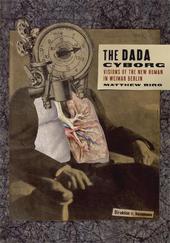
|
The Dada Cyborg: Visions of the New Human in Weimar Berlin
Paperback / softback
Main Details
| Title |
The Dada Cyborg: Visions of the New Human in Weimar Berlin
|
| Authors and Contributors |
By (author) Matthew Biro
|
| Physical Properties |
| Format:Paperback / softback | | Pages:400 | | Dimensions(mm): Height 254,Width 178 |
|
| Category/Genre | Art and design styles - c 1900 to c 1960 |
|---|
| ISBN/Barcode |
9780816636204
|
| Classifications | Dewey:709.4309042 |
|---|
| Audience | | Postgraduate, Research & Scholarly | |
|---|
|
Publishing Details |
| Publisher |
University of Minnesota Press
|
| Imprint |
University of Minnesota Press
|
| Publication Date |
12 June 2009 |
| Publication Country |
United States
|
Description
In an era when technology, biology, and culture are becoming ever more closely connected, The Dada Cyborg explains how the cyborg as we know it today actually developed between 1918 and 1933 when German artists gave visual form to their utopian hopes and fantasies in a fearful response to World War I. In what could be termed a prehistory of the posthuman, Matthew Biro shows the ways in which new forms of human existence were imagined in Germany between the two world wars through depictions of cyborgs. Examining the work of Hannah Hoech, Raoul Hausmann, George Grosz, John Heartfield, Otto Dix, and Rudolf Schlichter, he reveals an innovative interpretation of the cyborg as a representative of hybrid identity, as well as a locus of new modes of awareness created by the impact of technology on human perception. Tracing the prevalence of cyborgs in German avant-garde art, Biro demonstrates how vision, hearing, touch, and embodiment were beginning to be reconceived during the Weimar Republic. Biro's unique and interdisciplinary analysis offers a substantially new account of the Berlin Dada movement, one that integrates the group's poetic, theoretical, and performative practices with its famous visual strategies of photomontage, assemblage, and mixed-media painting to reveal radical images of a "new human."
Author Biography
Matthew Biro is professor of modern and contemporary art at the University of Michigan. He is the author of Anselm Kiefer and the Philosophy of Martin Heidegger.
|